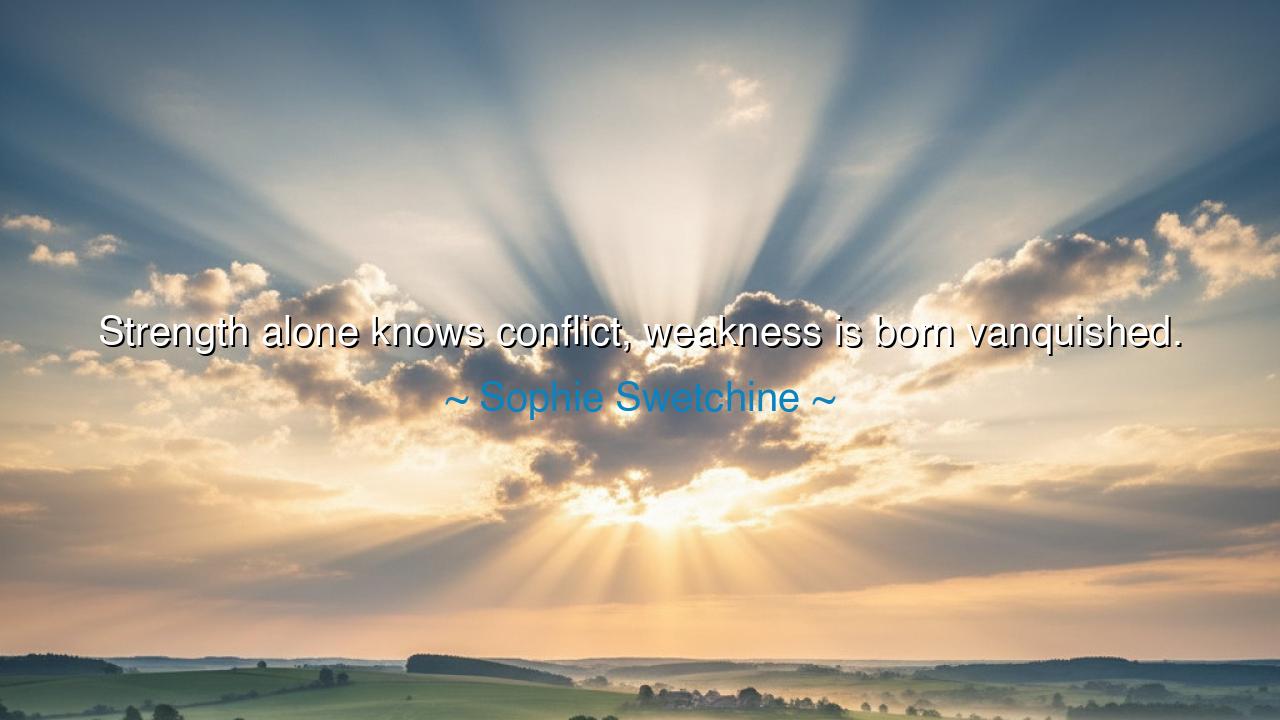
Strength alone knows conflict, weakness is born vanquished.






“Strength alone knows conflict, weakness is born vanquished.” — thus wrote Sophie Swetchine, the Russian-born mystic and thinker whose words burn with the quiet fire of experience. In this single line, she speaks of a truth known to all who have walked the path of struggle: that conflict is not the sign of failure, but the proof of strength. Only the strong wrestle with the forces of life, with doubt, with duty, with destiny. The weak are spared the battle, not because they are at peace, but because they have already surrendered. Swetchine reminds us that true strength is not found in comfort or ease, but in the courage to face resistance, to stand upright amid storms, to fight and be remade by struggle.
The origin of this quote lies in Swetchine’s own life — a life marked by exile, hardship, and spiritual rebirth. Born into privilege in Russia at the turn of the 19th century, she converted from the Orthodox Church to Roman Catholicism, a choice that cost her her homeland and her social standing. Forced to flee to Paris, she lived out her days in a quiet salon of faith and philosophy, guiding others through the same moral and spiritual conflicts she herself had endured. Her words sprang from the heart of experience. She had come to see that only those with inner strength are tested, and that conflict is the companion of growth. Weakness, by contrast, never rises high enough to be challenged — it is conquered before the battle begins.
When Swetchine says that “strength alone knows conflict,” she calls us to reimagine our understanding of struggle. Many believe that peace is the absence of pain, that strength means never wavering. But she teaches the opposite: the strong are those who enter the battlefield of life and dare to engage it. The warrior’s heart knows conflict because it refuses complacency. The artist knows conflict because he wrestles with beauty and truth. The saint knows conflict because she fights the shadows of her own soul. It is the weak who know nothing of struggle — for they yield too easily, their spirit bending before it can ever be tested.
Consider the story of Abraham Lincoln, a man forged in the fires of conflict. Born into poverty, burdened by depression, and condemned by his critics, he led his nation through its darkest hour — the American Civil War. Every day, he was torn between mercy and justice, unity and conviction. Yet through that inner and outer conflict, his strength revealed itself. He was not strong because life spared him suffering, but because he endured it with grace. His weakness would have been to flee from division, to seek comfort in compromise. But instead, he faced the war — and through it, he became a vessel of moral strength that reshaped history. His story proves Swetchine’s truth: that conflict is the crucible in which true strength is born.
There is a paradox in Swetchine’s wisdom. She suggests that the presence of conflict in one’s life is not a curse, but a blessing. For only through resistance does the spirit awaken to its power. Just as iron is hardened by fire and the seed must split to bring forth life, the soul too must break through pain to find its purpose. The weak, who fear struggle, remain unformed — soft clay never shaped by the hand of destiny. But those who accept conflict as their teacher rise beyond fear. They come to see that the battle is not against others, but within — a battle between what we are and what we are called to become.
And yet, Swetchine’s words also carry compassion. She does not glorify endless warfare of the heart, but rather the nobility of perseverance. She reminds us that strength is not arrogance, but endurance; not loud triumph, but quiet faithfulness. To know conflict is not to live in despair, but to be alive to one’s purpose. The strong, though scarred, emerge wiser and gentler, for they have seen the cost of every victory. The weak, untouched by battle, remain untested — their peace is the peace of surrender, not the peace of conquest.
The lesson, then, is timeless: embrace the conflicts that life places before you. Do not shrink from difficulty, nor curse the weight upon your shoulders, for it is the proof that you are strong enough to bear it. When you face hardship, loss, or doubt, remember Swetchine’s words — “weakness is born vanquished” — and know that your struggle is not defeat, but transformation. Seek the fight that builds your spirit, not the ease that dulls it. For only those who wrestle with darkness come to know the dawn.
So let the wisdom of Sophie Swetchine echo in your heart: “Strength alone knows conflict.” Take courage, then, when life’s storms gather around you. Do not envy those who seem untroubled, for often their peace is but the stillness of resignation. Instead, stand tall in the winds of your struggle. For it is there — in the clash of forces, in the ache of endurance, in the silence after battle — that the soul discovers its greatest truth: that strength is not the absence of struggle, but its reward.






AAdministratorAdministrator
Welcome, honored guests. Please leave a comment, we will respond soon